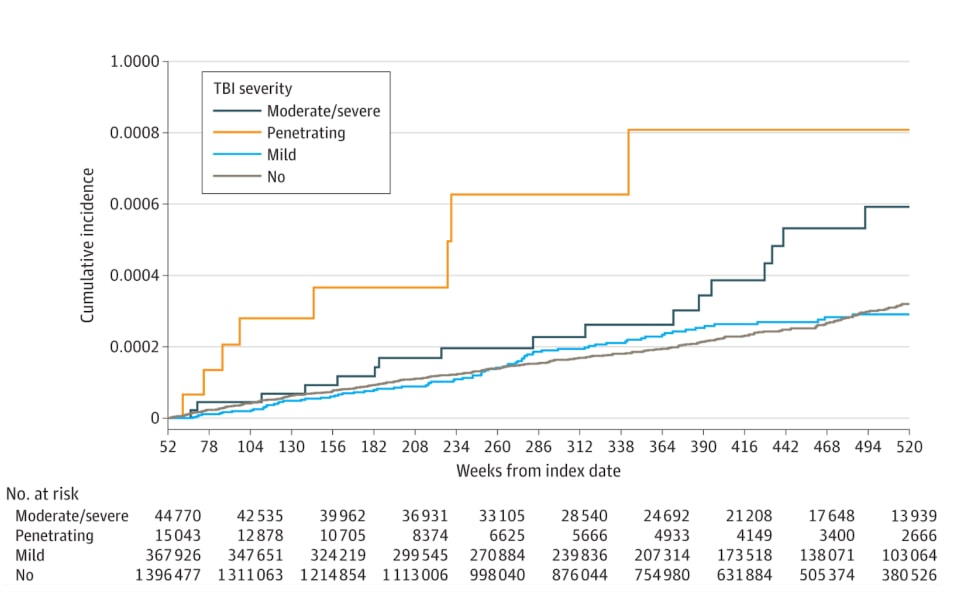STUDY: Traumatic Brain Injuries Linked to Brain Cancer Risk
The heightened risk of brain cancer should be factored into future medical costs for moderate-to-severe TBI survivors.
A 2024 cohort study found that some types of traumatic brain injuries (TBI) are correlated with brain cancer risk. A review of the medical data from 1.9 million veterans showed moderate to severe TBIs to be positively correlated with brain cancer diagnoses.
The original investigation, conducted by researchers at the Uniformed Services University of the Health Sciences and published in JAMA Network Open, found veterans with moderate to severe brain injuries to be at a 90% increased risk for developing brain cancer.
Even more alarming is the researchers’ findings with the most severe TBIs. Veterans who survived a penetrating brain injury, an injury that results in skull fracture and damage to parts of the brain, saw triple the risk of developing subsequent brain cancer: a 300% increase.
Need a Brain Injury Lawyer? Call Mattlaw Now: 813-222-2222
The Study
According to US News and World Report, Navy Reserve Cmdr. Michael Dore first suspected the correlation between TBI for brain cancer while treating patients at the Naval Medical Center in Portsmouth, Virginia. The military doctor sought out any relevant data from Uniformed Services University, which included nearly 2 million veterans’ medical histories pulled from the Defense Department and Department of Veterans Affairs records.
The study, titled “Traumatic Brain Injury and Subsequent Risk of Brain Cancer in Veterans of Iraq and Afghanistan Wars,” found that nearly 25% of the 1.9 million-member cohort had experienced a TBI: 385,848 had a mild TBI; 46,859 had a moderate or severe TBI; and 17,173 had penetrating TBIs. The two latter groups were found to be at much higher risk for developing brain cancer later in life: 90% and 300%, respectively. Fortunately, no correlation was found between mild TBI and brain cancer risk.

Stewart, Howard, Poltavskiy, Dore, et. al. “Cumulative Incidence Functions for the Outcome of Malignant Brain Cancer Stratified by Traumatic Brain Injury Severity”. https://jamanetwork.com. February 15, 2024. https://jamanetwork.com/journals/jamanetworkopen/fullarticle/2815179.
The study provides meaningful evidence to suggest a correlation between combat-related brain injury and brain cancer risk. Showing potential connections between battlefield trauma and longer-term health risks can help inform prevention and care of other TBI survivors. The risk of a costly and potentially fatal brain tumor should be factored into future medical costs for any and all moderate-to-severe TBI survivors.
How common is brain cancer?
Brain cancer is fairly uncommon; it occurs in less than 1% of the population. However, it can be a devastating diagnosis, and can affect both longevity and quality of life, even in remission. According to the National Brain Tumor Society, only about 1 in 3 people diagnosed with a primary brain cancer survive more than five years.
Those living with the most common form of brain cancer, glioblastoma, have a 6-22% chance of surviving five more years or more. Older adults have a higher likelihood of succumbing to brain cancer within five years.
Brain tumors can start in the brain cells or blood vessels of the brain, or metastasize from another part of the body. Medical care for brain cancer is notoriously expensive. The American Cancer Society estimates the average monthly medical expenses for brain cancer treatment are in excess of $8,000 ($96,000 a year).
How common are traumatic brain injuries?
“Traumatic brain injury is not only common in the military, but also in the general population as well,” said lead researcher Dr. Ian Stewart, an Air Force colonel and professor of medicine at the Uniformed Services University of the Health Sciences (as reported in Military News).
Moderate to severe head injuries are relatively rare in the general population, but they do occur with alarming frequency in motor vehicle accidents, contact sports like football, and active military service.
According to the Brain Trauma Foundation, “TBI is the leading cause of death and disability in children and adults ages 1 to 44. Populations that are most affected are youth and elderly who have falls. Each year about 2.5 million individuals have TBIs of which approximately 50,000 result in death, and over 80,000 suffer permanent disability.”
Why do people develop brain cancer?
The full mechanism of developing brain cancer is not yet known, but exposure to ionized radiation has been strongly correlated with malignancies in the brain tissue. The relationship between head injuries and brain cancer is relatively new, but this new data suggests that previous moderate-to-severe traumatic brain injury, as well as penetrating brain injury, may be a factor in developing brain cancer later in life.
This finding is one more reason to take TBIs seriously, and to support our veterans as they navigate the health risks following their years in the service.
Is traumatic brain injury a disability?
Depending on the severity of the injury and the parts of the brain affected, a traumatic brain injury is considered a disability. You may be able to receive long-term disability benefits for your TBI, particularly if your injury resulted in cognitive difficulties, relationship challenges, wage loss, and/or changes to your quality of life.
Even with intensive treatment, however, a traumatic brain injury can result in a permanent disability. To improve your chances of filing a successful disability claim, it is a good idea to talk to a brain injury attorney about your case.
Is a concussion a traumatic brain injury?
Yes, a concussion is considered a mild traumatic brain injury.
This type of injury results from a blow to the head or a rapid movement to the skull. This sudden movement can stretch and damage brain tissue and trigger a chain of harmful changes within the brain that interfere with normal brain activities. A concussion may result in dizziness, nausea, disorientation, and temporary loss of consciousness. It may take days or weeks to recover from even a mild concussion.
Call 813-222-2222 for a Free Consultation with a Brain Injury Attorney
